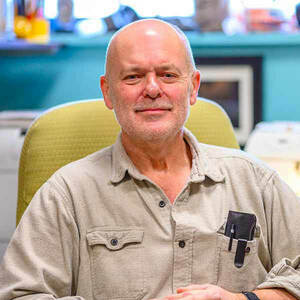Faculty Luncheon: "Why the Moon Needs a Globally Distributed, Long-Lived Geophysical Network" by Clive Neal

ND Energy Faculty Luncheon Seminars are held monthly with interested faculty to facilitate cross-disciplinary research collaborations and to enable development of proposal ideas for upcoming funding opportunities. All interested faculty from diverse fields are invited to attend.
The discussion topic for this luncheon will be centered around a presentation by Prof. Clive Neal, professor in the Department of Civil and Environmental Engineering and Earth Sciences, titled "Why the Moon Needs a Globally Distributed, Long-Lived Geophysical Network."
This 35-40 minute talk will be followed by discussion with Prof. Neal focused on (1) cross-disciplinary basic research needs, (2) potential avenues for external and internal collaborations, (3) funding sources to target, and if everyone is agreeable, (4) 'follow-up actions' that we can track. With all the faculty engaging in the discussion part of this luncheon after the talk, we expect to have a very stimulating and inspiring exchange of ideas.
For more information on the ND Energy Faculty Luncheon Seminars, contact Subhash L. Shinde at sshinde@nd.edu.
Abstract
The Apollo Lunar Surface Experiment Package (ALSEP) was deployed by Apollo 12, 14, 15, 16, and 17 and contained various geophysical instruments. This allowed narrow networks of seismometers, laser retroreflectors, test flow probes, and magnetometers to be established on the central near side of the Moon that were active until 30 September, 1977, when NASA shut down the networks to save money. The data returned showed the Moon was seismically active and it contained at least a partially molten core. However, many questions remain that have implications for planetary and Solar System science as well as for human exploration. This seminar will review what we have learned from the ALSEP networks, what remains to be understand, and will outline a Notre Dame-led mission to establish a globally distributed, long-lived geophysical network around the Moon.
Biography
Clive R. Neal grew up and was educated in the United Kingdom and became a United States citizen in 2013. He obtained his Ph.D. in geochemistry and petrology in 1986 from the University of Leeds, UK. He moved to the United States later in that year where he spent four years as a post-doctoral research fellow at the University of Tennessee – Knoxville. While there, he studied mantle petrology and was introduced to the study of Apollo lunar samples, and has been involved in the study of the Moon since then using samples, as well as remotely sensed data from missions including and since Apollo. He is currently a Professor of Planetary Geology at the University of Notre Dame in Indiana.
Neal continues to publish his research and has over 130 peer reviewed scientific journal articles. He has served on numerous mission and research review panels, including being the Chair of the Lunar Sample Allocation subcommittee 2005-2009, and was a member of the Senior Review panel for NASA’s Planetary Science Division in 2012 and chaired that panel in 2014. Neal was the chair of NASA’s Lunar Exploration Analysis Group from 2006-2010, where he led a community effort to develop the Lunar Exploration Roadmap, and again from 2015-2018, where he formed the LEAG Commercial Advisory Board. In 2019, Neal was invited to give testimony at the sixth meeting of the National Space Council at the Smithsonian’s Udvar-Hazy Center in Chantilly, Virginia. regarding the importance of in situ resource utilization. He is currently a member of the National Academies Committee on Astrobiology and Planetary Science and has helped in the training of future NASA astronauts. In 2021, Neal received the LEAG Service Award, which is given to an individual who has demonstrated extensive service to LEAG and/or the lunar community through excellence in leadership, continuous dedication to mentoring and enriching he early-career community, an extensive track record in the field of science and/or exploration of the Moon. Neal is passionate about NASA and in returning humans to the Moon and beyond in a sustainable, economically beneficial, and permanent way. In 2015, he received the NASA Wargo Award for contributions to the integration of exploration and planetary science throughout his career.